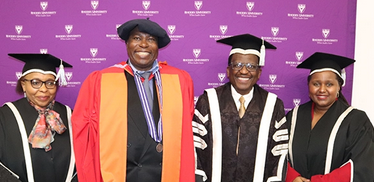By Bukamuso Sebata
Rhodes University’s Eden Grove Blue Lecture Theatre was abuzz with excitement as scholars gathered to witness the inaugural address of Professor James Gambiza. The event, a prestigious milestone in an academic’s career, marks the conferral of full professor status on a scholar who has showcased exceptional scholarly contributions to their discipline.
In his welcoming speech, Rhodes University Vice-Chancellor Professor Sizwe Mabizela hailed Gambiza’s remarkable achievements and contributions throughout his academic journey. Gambiza holds various qualifications, including a PhD and MSc in Biological Sciences from the University of Zimbabwe and an MEd and a PGDipHE from Rhodes University. His expertise lies in innovative teaching and adult education, particularly in conservation and rangeland management, where he promotes sustainable practices.
He has received notable recognition, awards, and accolades for his teaching, research, and publications. For Gambiza, the inaugural lecture titled “Land degradation in a changing world: Looking back and into the future” reflected profoundly on his life’s work. The lecture delved into the pressing environmental issue of land degradation in the 21st century, negatively impacting over 3.2 billion people worldwide.
Using the analogy of a “systems journey,” Prof Gambiza’s lecture evaluated past approaches to addressing land degradation and presented historical timelines of global and national efforts. He also drew attention to the devastating effects of extreme weather events and stressed the importance of adopting a holistic perspective to create a sustainable future for humanity.
He discussed the concept of planetary boundaries, urging the need to stay within these limits to avoid overshooting. To raise awareness and motivate action, he suggested creating a song on planetary boundaries and the doughnut economics model we can sing together with both local and global communities. The concept of doughnut economics advocates balancing the social foundation and ecological ceiling for sustainable development.
Drawing on various international and African case studies and initiatives, Gambiza highlighted the significance of employing diverse strategies to combat land degradation and promote ecological restoration. Specific projects in the Eastern Cape, where sustainable land management practices were implemented in collaboration with local communities to improve livelihoods, were also mentioned. Another important forthcoming programme is the Great Green Wall National Action Plan for South Africa and the Southern African Development Community (SADC).
The inaugural address concluded with a passionate call to action. Gambiza urged the audience to proactively seek solutions and engage in projects promoting ecological restoration and combating land degradation. With his wealth of knowledge and commitment to addressing environmental challenges, Prof Gambiza’s inaugural lecture left a lasting impression on all who attended, sparking a sense of responsibility and motivation to work collectively for a sustainable and prosperous future.
To watch this inaugural lecture, go to: https://youtu.be/bYYuihWr-Lc
(This is an edited version of a story that first appeared on the RU website).


